
Farscape is an Australian-American science fiction television series conceived by Rockne S. O'Bannon and produced by The Jim Henson Company and Hallmark Entertainment, originally for the Nine Network. It premiered in North America on the Sci-Fi Channel's SciFi Friday segment on 19 March 1999,, as the network's anchor series. The Jim Henson Company is credited with the many alien looks, make-up and prosthetics; two regular characters on the show, the animatronic puppets Rygel and Pilot, were entirely Henson Creature Shop creations.

Rockne S. O'Bannon is an American television writer, screenwriter and producer, working primarily in the science fiction genre. O'Bannon has created five original television series.
"Coming of Age" is the nineteenth episode of the American science fiction television series Star Trek: The Next Generation. It first aired in broadcast syndication on March 14, 1988. Sandy Fries originally wrote the episode, but Hannah Louise Shearer performed an uncredited re-write. It is the only episode of the series directed by Mike Vejar, who went on to direct episodes of Deep Space Nine, Voyager and Enterprise.
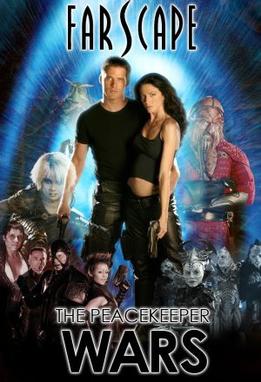
Farscape: The Peacekeeper Wars is a military science fiction television miniseries written by Rockne S. O'Bannon and David Kemper and directed by Brian Henson. Following the original series' cancellation in September 2002, it aimed to wrap up the cliffhanger and tie up some elements of the series in general. It was broadcast on 17 and 18 October 2004. Henson and others have attributed the return of Farscape to the ongoing campaign of fans. Production began in December 2003. In May 2004 the Sci-Fi Channel, now owned by NBC Universal, announced that it would run a two-episode conclusion titled Farscape: The Peacekeeper Wars.

Colonel Cameron "Cam" Mitchell, USAF is a fictional character in the 1997 American military science fiction television series Stargate SG-1, a science fiction show about a military team exploring the galaxy via a network of alien transportation devices. Played by Ben Browder, Cameron Mitchell is introduced as a main character in the season 9 premiere "Avalon", holding the military rank of lieutenant colonel in the United States Air Force. Learning of the SG-1 team's off-screen separation after the previous season, Mitchell is assigned as new commanding officer of SG-1, which he remains throughout season 10 (2006–2007) and the direct-to-DVD films Stargate: The Ark of Truth, ending at the rank of colonel for Stargate: Continuum (2008).
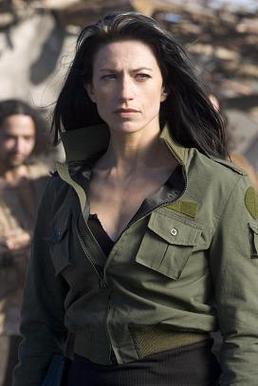
Vala Mal Doran is a fictional character in the American military science fiction television series Stargate SG-1 about a military team exploring the galaxy via a network of alien transportation devices. Played by former Farscape actress Claudia Black, Vala was created by Damian Kindler and Robert C. Cooper as a guest character for the season 8 episode "Prometheus Unbound" (2004). Because of the on-screen chemistry between Black's Vala and Michael Shanks' character Daniel Jackson and the character's popularity with the producers and the audience, Claudia Black became a recurring guest star in season 9 (2005–2006) and joined the main cast in season 10 (2006–2007).
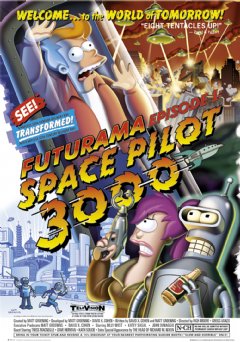
"Space Pilot 3000" is the pilot episode of the American animated television series Futurama. It originally aired on the Fox network in the United States on March 28, 1999. The episode focuses on the cryogenic freezing of the series protagonist, Philip J. Fry, and the events when he awakens 1,000 years in the future and is the first episode to be set in the 30th century. Series regulars are introduced and the futuristic setting, inspired by a variety of classic science fiction series from The Jetsons to Star Trek, is revealed. It also sets the stage for many of the events to follow in the series, foreshadowing plot points from the third and fourth seasons.
"200" is the sixth episode of the science fiction television series Stargate SG-1's tenth season, and the 200th episode of the series overall. Unlike the more serious nature of the season's story arc, "200" is a light-hearted parody of both Stargate SG-1 and other sci-fi shows, as well as popular culture like The Wizard of Oz.
"Scientific Method" is the 75th episode of Star Trek: Voyager, the seventh episode of the fourth season.

"Premiere" is the pilot episode of the Farscape series. It was written by series creator Rockne S. O'Bannon and directed by Andrew Prowse. It is the only episode in the series whose opening credits lack Crichton's usual voiceover.

"I, E.T." is the second episode from the first season of the television series Farscape, written by Sally Lapiduss and directed by Pino Amenta. This episode originally aired following "Thank God It's Friday, Again", episode #6.
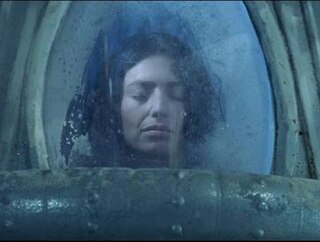
"Season of Death" is an episode from the third season of the Australian television series Farscape, written by Richard Manning and directed by Ian Watson.

"Bad Timing" is the series finale of the Australian-American television series Farscape, written by David Kemper and directed by Andrew Prowse.

"Field Trip" is the twenty-first episode of the sixth season of the science fiction television series The X-Files. It premiered on the Fox network on May 9, 1999, in the United States and Canada, and subsequently aired in the United Kingdom on Sky1 on July 18. The episode was written by John Shiban and Vince Gilligan, from a story by Frank Spotnitz, and was directed by Kim Manners. The episode is a "Monster-of-the-Week" story, unconnected to the series' wider mythology. "Field Trip" earned a Nielsen household rating of 9.5, being watched by 15.40 million people in its initial broadcast. The episode received largely positive reviews from television critics.

Farscape: The Game is an action-adventure video game, released in 2002, based on the first season of the science-fiction television show Farscape. It was developed by Red Lemon Studios.
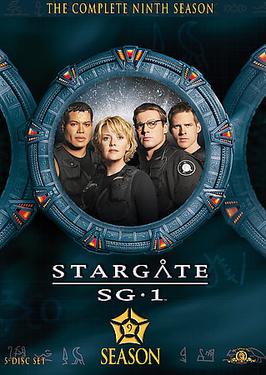
The ninth season of Stargate SG-1, an American-Canadian television series, began airing on July 15, 2005, on SCI FI. The ninth season concluded on March 10, 2006, after 20 episodes on the same channel. The series was originally developed by Brad Wright and Jonathan Glassner, and Brad Wright, Robert C. Cooper, Joseph Mallozzi and Paul Mullie served as executive producers. The season arc centers on the new threat of the Ori, a race who Daniel Jackson and Vala Mal Doran unleash in an unknown galaxy, and who are threatening to prepare for a crusade into the Milky Way galaxy to convert the beings to their religion called Origin.
Profanity in science fiction (SF) shares all of the issues of profanity in fiction in general, but has several unique aspects of its own, including the use of alien profanities.
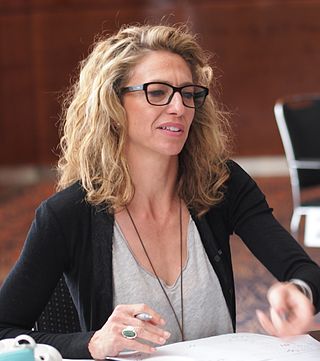
Claudia Lee Black is an Australian actress, best known for her portrayals of Aeryn Sun in Farscape, Vala Mal Doran in Stargate SG-1 and Sharon "Shazza" Montgomery in the film Pitch Black. She has had prominent roles in video games, such as Admiral Daro'Xen and Matriarch Aethyta in Mass Effect, Chloe Frazer in Uncharted, Morrigan in Dragon Age, Whitney Chang in The Amazing Spider-Man, Tess Everis in Destiny, and Samantha Byrne in Gears of War 3, Gears of War 4, and Gears 5. She also had a recurring role as Dahlia in The Originals and starred as Dr. Sabine Lommers in TV series Containment.
"Chestnut" is the second episode in the first season of the HBO science fiction western thriller television series Westworld. The episode aired on October 9, 2016, but was released two days prior online by HBO. The episode received positive reviews from critics.














